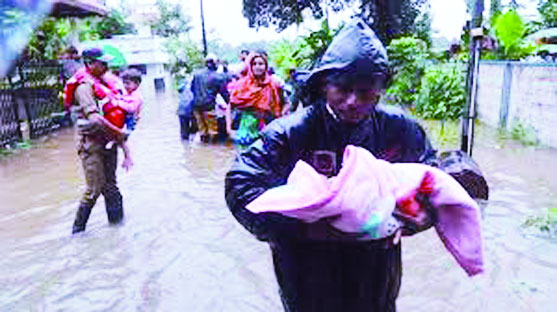Mother nature punished humanity in India hard this year with devastating floods in Kerala and Manipur. But humans continue to treat the planet with contempt
The devastating floods that ravaged central Kerala earlier this year reminded all of India about the brute power of nature once again. It was also a reminder that much of the tragedy was created. All thanks to man-made causes such as rampant illegal construction in the hills above Kerala’s wonderful beaches. All of this also speaks volumes about the resilient nature of humans. Residents in Kerala have recovered smartly from the floods. However, it is yet another lesson that India will suffer tremendously from global climate change that is driving extreme weather phenomena. India, which is working extremely hard towards meeting its commitments under the Paris Climate Accord, does, however, find itself in a bind. With the need to lift hundreds of millions of people from extreme poverty and an equal number from subsistence farming, there is a need to provide them with electricity and means towards economic progress. Unfortunately, the only effective means to do so are through consumption of more carbon, whether through thermal plants or burning gas for cooking; although the latter is better than burning firewood.
The brown haze that envelopes much of India throughout the year is taking a toll on the lungs of people and endangers our children, particularly those from the poorer sections of society. Air quality in many cities on the northern plains every winter becomes critical with cases of asthma and lung cancer shooting through the roof. The Himalayan glaciers continue to recede and poor crop planning has meant that a water-stressed country like India actually ends up exporting water through its agricultural exports, while those in the cities thirst for water just to drink. There is no doubt that the Narendra Modi administration has continued some good work in changing energy policies with a clear pivot to solar energy and moving people away from firewood, yet thousands of crores need to be spent by the Government and the industry alike. The usage of pet-coke, the dirty sludge left over from refining crude oil, by industries in India is a problem. Yet there needs to be balanced environmental action because industrialisation and all its ills, pollution and mining among them, are important if India is to generate jobs for its youth. But the biggest crisis facing India is battling global effects of abuse by developed countries. India must make the developed world pay for those problems, particularly rising sea levels, thanks to decades of unsustainable carbon emissions leading to global warming. Hundreds of millions of Indians live in coastal regions and in river deltas that will be adversely impacted by even a few inches of rising waters. Cities like Mumbai and Kolkata will be very hard hit. And even though some of the worst impacts might be over a decade away, we have to start planning for this eventuality. It is India’s misfortune that its politicians have not put the environment front and the centre; even in the national capital region, poor air quality, which might have brought down Governments elsewhere, is not a major political issue. One can only hope that this will change in 2019.


























